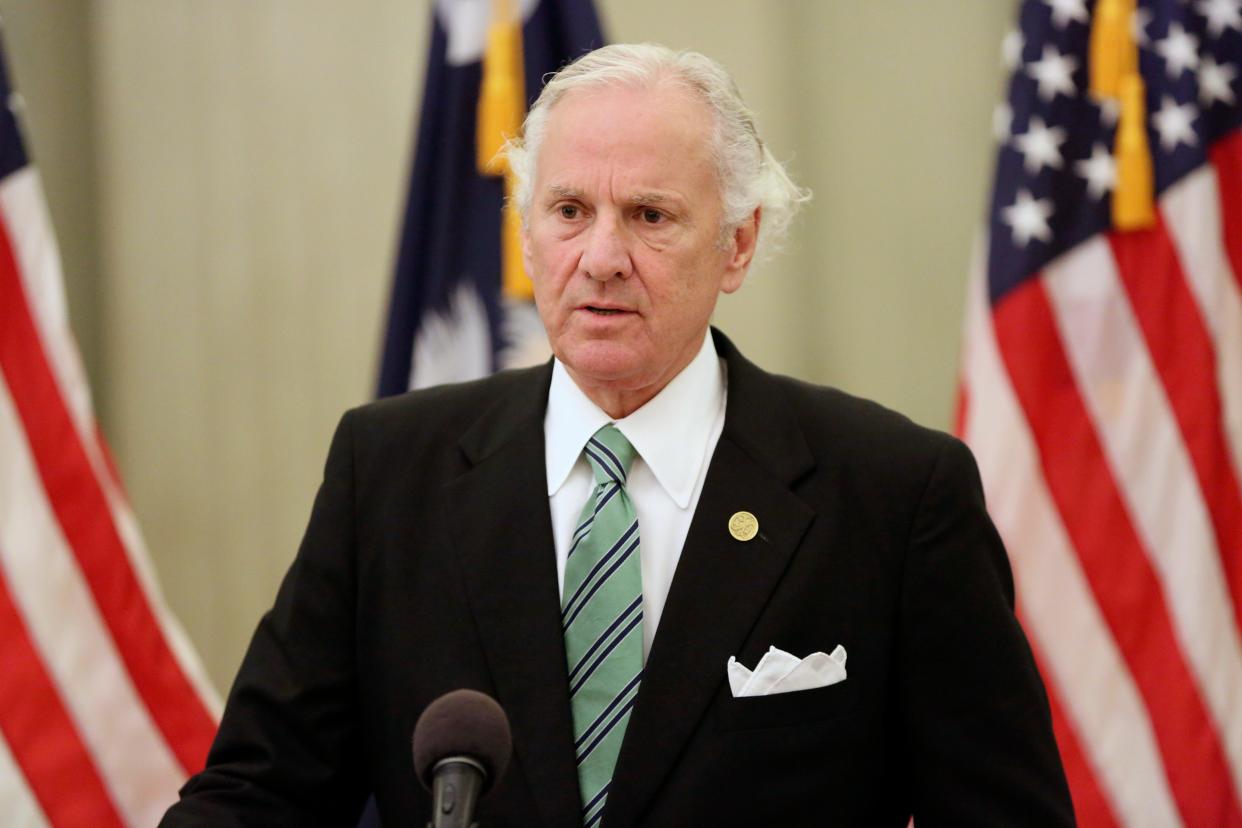McMaster proposes education funding overhaul, increased staff pay, improve transparency

- Oops!Something went wrong.Please try again later.
Gov. Henry McMaster has proposed to increase minimum teacher salaries across the state to $38,000 per year as part of a plan that would rework the state's education funding formulas.
The proposal, presented to reporters as part of a briefing by members of the Governor's Office staff, is geared toward addressing teacher shortages in South Carolina and allocating funds based on both student needs and a district's ability to collect tax revenue.
The $120 million proposal would raise funding for students living in poverty, something both education advocates and the Governor's Office said could address educational disparities.
Districts also would receive funding for students with all intellectual disabilities, not just autism spectrum disorder.
The overhaul of the funding mode that dates to 1977, would increase the state education budget to $3.4 billion from $3.3 billion.
From November: Greenville County Schools reviewing books after McMaster calls for statewide investigation
Patrick Kelly, with Palmetto State Teachers Association, said the group was "encouraged by a lot of the broad contours of the policy proposals the governor's making."
"We think there's some important and necessary reforms that are at the core of his education budget," Kelly said.
Generally, education funding comes from several sources. But the biggest share comes from a funding model set by the 1977 Education Finance Act.
The model is based on a district's taxpaying ability, student needs that warrant more money — "weights" and the "base student cost," which is a sum of all the monies spent to get a student through all levels of schooling.
Under this law districts such as Greenville County, which earned a lot of revenue through the growing number of properties, were supposed to get less state money compared to property-scare school districts. This would help reduce funding gaps between rich and poor districts. However, this law has remained more or less unchanged since 1977.
By itself, most policy advocates and lawmakers agree that the concept of "base student cost" is confusing. Research has shown that the state by spending $2,485 per student, as per 2021 figures, spends $675 less on every student, Kelly said.
But with McMaster's proposal that was unveiled this week, that category will no longer exist. Instead, all student needs are lumped together.
In the existing law, the state pays about 70% of the EFA, leaving the remaining 30% for local districts to cover. The new recommendation changes the split to 75% - 25%.
An analysis provided by the governor's office suggests that of the 79 school districts, 72 will receive more funds. Greenville County School District, based on figures from 2019-2020, would get nearly $7 million in additional funding. It's unclear how much different the funding will be from 2021, as that data is not yet complete.
Information on how the money is spent will be published on a dashboard maintained by the SC Department of Education.
Because 52 school districts, including Greenville County School District and school districts in Anderson and Spartanburg counties, already pay above the proposed minimum salary, they are not required to increase the salaries and have the option to decide how they want to use the funding.
While the state would not be mandating pay raises for teachers and requiring the additional funding to be used for that reason, each district would be required to publish on its website how the district's budget is being spent.
Essentially, the Governor's Office said the proposal is aimed toward "greater accountability and more public transparency in how funds are expended."
However, there are concerns of whether this increase is enough and Kelly said that there is a fear that teacher shortages will only become much worse later.
For example, Greenville County School District's current minimum starting teacher's salary at $42,000 is not enough to live comfortably in a growing and more expensive county.
Entry-level teachers can afford a two-bedroom apartment around Greenville, which costs about $842, but three and four-bedroom apartments are largely out of reach for that salary range, as per data from the National Low Income Housing.
Housing news: What does it take to afford 'affordable housing' in Greenville? You might be surprised
More: The 'affordable housing' planned in Greenville largely ignores those who need it most
Rep. Garry Smith, R-Greenville, said this proposal was part of budget proviso before the COVID-19 pandemic started and will not come as a shock to lawmakers.
Back then, the General Assembly chose to go with an older version of the budget instead of making a new one to ride out the economic downturn.
Currently, the Greenville County School District has 33 teacher positions open, according to the district's Director of Media Relations Tim Waller.
Compared to other states in the Southeast such as Georgia, Alabama, and Mississippi, South Carolina ranks at one of the lowest minimum starting salaries for teachers.
"Funding education is a state and local responsibility," the office said.
As this budget moves towards the General Assembly, questions about other education funding sources related to Act 388 and Elementary and Secondary School Emergency Relief (ESSER) Funds persist.
Education and Family Issues Reporter Krys Merryman can be reached at 864.420.7111 or kmerryman@greenvillenews.com. Continue the conversation or join a new one on our Education and Family Issues in Greenville Facebook page or on Twitter @krys_merryman.
Devyani Chhetri is the state government watchdog reporter. You can reach her at dchhetri@gannett.com or @ChhetriDevyani on Twitter.
This article originally appeared on Greenville News: Gov. McMaster proposes increased staff pay, transparency in budget

